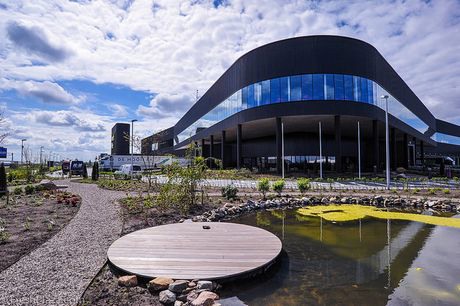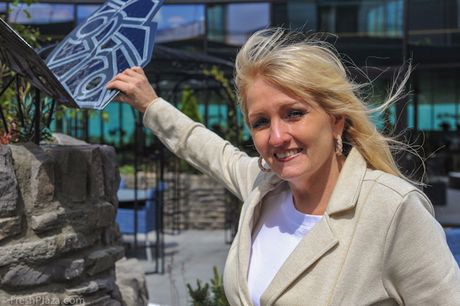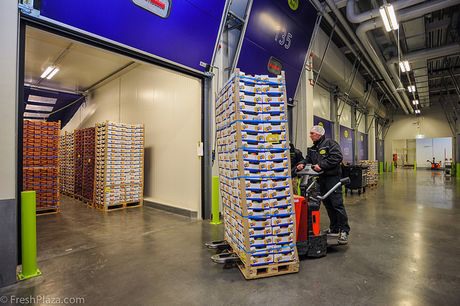Click here for the photo report

Nature's Pride moved into a fantastic new location in Maasdijk at the end of 2013. What requirements did this location have to meet?
"After we had decided how big the building had to be, everyone put through their wishes. Things that were mentioned were good lighting and an open floor plan. We also wanted to have an energy neutral location. We really focussed on that: we hired a sustainability architect and sustainability consultants, who guided the entire development and building process."

Click here for the photo report
Was being energy neutral disappointing?
"We did everything possible at that moment, and now use 30% less energy than in the old location. This location is no more expensive than the old one per square metre. Everyone says being sustainable is expensive, but it doesn't have to be. You have to figure out how to save energy smartly. We did this. The only way for us to take it down completely would be to buy a windwill. But that isn't that easy.... A windmill is expensive, it costs three million Euro. But you get it back slowly. If they told us tomorrow that we could build a windmill and the energy would costs us 100% more, we would still do it. From a conviction that we have to think about the future and our children."

Shawn Harris, director Nature's Pride.
But you can only buy a windmill if you're earning enough. A lot of similar companies can't make investments like that...
"It is important to make a profit. If you don't your company can’t exist. You wouldn't be able to invest in innovation and development. We have complicated processes, like ripening and packaging and needed a location that would work for us. But there are a lot more companies that also make good money. I'm convinced of this."

Click here for the photo report
The Netherlands profiles itself as a country that supports sustainability. Do you not find it difficult that it's not possible to build a windmill?
"I try to give it a place, but it is difficult. I understand you can't just build a windmill anywhere and that the Netherlands is a small country on which a lot has already been built. But it's still a disappointment."
Were you angry?
"Yes I was a little angry. I'm annoyed by the fact that I got a 'no' to something I thought was fantastic. We obtain mangos and avocados from eight thousand kilometres away. We ripen them and are responsible for trying to do it energy neutrally. It bothers me that we can't do this. But I'm not giving up until we succeed."
How do your customers respond to your sustainability? Do they appreciate this or are price and product still most important?
"I think the customer appreciates that we are trying to be energy neutral and also working towards a better environment for your people and the future world. I expect it to be mandatory within the next five to ten years. And we will be ahead. For instance, you can see that Mercedes Benz is requiring its subcontractors to be energy neutral by 2017. If you're not, you can no longer supply them. The world is heading in this direction and we have to join it."

What do your ripening chambers look like?
"We have forty independently linked ripening chambers. This means we can ripen products separately per ripening chamber. And we need to. A mango has a very different ripening process than an avocado. Both products need 3.5 days of heating and 1.5 days of cooling. But you start the avocado at 5 degrees and the mango at 10. Then you need to finetune the process, because there is a different country of origin every time and so different condition apply. But in general the secret is that you need to do it slowly, not forcing the product."
Click here for the photo report
Is it easy to educate a ripener?
"No, it takes at least two years. And you can't just find them anywhere. That's why we have to look within the company for people who want to learn."
There are more and more companies on the market that ripen. But you also see more supermarkets like Edeka who are starting their own ripening chambers.
Are you not afraid that they will take over the ripening in the long term?
"They could, and you can't underestimate it. But a number of retailers have already stopped this, as you need a constant supply and consistent good quality. And you have to sort. Bananas are also better organised than mangos and avocados. When I look at how much effort it takes to get the right mango here after nine years..."

Who are your main customers?
"All our customers are important. We value every customers for their individual characteristics and specific wishes."
The Nowegian BAMA group is a large share holder of Nature’s Pride. What percentage of Nature’s Pride’s turnover goes to them?
“25%. It has been like that from the start.”
Do you try to keep BAMA’s share as small as possible by attracting more European customers?
“That was our goal from day one. BAMA is our base and we are also trying to build a customer base in Europe. That isn’t easy. It’s hard work every day.”
Click here for the photo report
In its first years, Nature’s Pride was an exotics supplier. When did you start the ‘Ready to Eat’ programmes?
“That was in 2005. We were only supplying to Norway at the time. In 2006 we started our ‘Ready to Eat’ box with ready to eat fruit for wholesale. And in 2007 we started supplying to the retailer.”
Many of those who laughed at the ‘Ready to Eat’ concept eight years are now following in your footsteps. Can you notice more ‘Ready to Eat’ competition?
“Yes, and we need it. I don’t think you’ll find a hard avocado or mango in the supermarket in five years time. Competition has to come and we’re happy with it. We can’t be the sole supplier for Europe and have a customer base we want to focus on. I do hope that they do well, that they can supply a perfect product and sort out the bad specimens. Because one in ten mangos in a box tends to be off. If you leave it in the box, you’re tricking the consumer. As well as that, you will have a different price that doesn’t match ours. People sometimes say that we are expensive. But we took out the one bad mango. That’s ten percent. And it bothers us a little. But competition is no problem.”

Click here for the photo report
How important is automation for the ‘Ready to Eat’ programme?
“Very important. We can now also scan the internal quality with an optical sorting machine. But we shouldn’t think that those machines are THE solution. You have to get to know them well first, as every mango and avocado is different and there are differences in seasons. You have to constantly supply a sorting machine like this with information. If you don’t it’s no use. The biggest mistake you can make is this: I have a machine that already has all the hard and software so I don’t have to do anything myself. No way! You have to feed the machine information yourself. And it costs a lot of time and money.”
What else is important in the ‘Ready to Eat’ concept?
“The main thing is the quality of the fruit that you buy. The ‘Ready to Eat’ concept requires you to make sure that the customer has 100% edible fruits. As far as that’s concerned, we are a little ahead of the rest as a specialist. But it has been a process of nine years with continuous improvements until the growers were perfect, the deliveries came in, the products were almost the same, they were able to be ripened well and we could supply top quality without a lot of problems.”
But can you only do this if you control the entire chain?
“Yes. We pass our specifications on to the growers. It is certainly a challenge to make the chain as insightful as possible and control it well.”
What percentage of the chain do you think you have under control?
“85%. And I think we could make it to 95%.”
So that is still a big challenge?
“Yes. After nine years of hard work, we are only at 85%. But we believe it is very important that our customers have the right products in their shops. If a product doesn’t have the right values, we don’t want it. A lot of companies don’t understand or ignore that.”
Are you not afraid that the demand from China will become so big that you will lose suppliers in Central America?
“No. You have to pay and roll with the prices. And make sure that you have a good relationship with your growers. If you show that you’re doing well, your suppliers won’t go to China for a few more Euro. We also have the advantage that mangos and avocados aren’t the main fruits in China. What is a problem is that the demand for avocados in America is growing hugely. There will be a shortage. Avocado is a real superfood. It’s healthy, versatile and easy to use.”
Click here for the photo report
Have you ever considered beating the competition and opening a location in Asia?
“No, I’ve never thought about it. I think you have to stick to your core business. We are not a grower and never will be. We are an importer, ripener and distributor in Europe, and we’re good at what we do. We need to focus on that.”
What do you think when you see what colleagues are doing in European supermarkets?
“Competition is healthy, I’m not afraid of it at all. I have to focus on what Nature’s Pride is down and we just have to keep doing it better. The art is to meet the customer’s wishes every day. If we focus on that, I think we will have a good future.”
Avocado and mango are THE products in your company. Do you want to extend your assortment?
“Yes, we want to extend our base of mangos and avocados with ‘Ready to Eat’ kiwis, pears and plums, for example. Products that need added value, that’s where we see a future. And our customers are asking for it. We want to take a new step with new products. We didn’t have the capacity until now.”
Last year Nature’s Pride had a turnover of 180 to 190 million Euro. How much more can you grow?
“We are now ripening 22 containers of avocados and 18 containers of mangos per week. If there is enough supply, we could double it.”
Have you set yourself a particular goal concerning the growth?
“No, we don’t have a goal. You do have to accept that you’re going to grow as a company and prepare for that growth. As far as avocados and mangos are concerned we grow around 35% in volume each year. With forty ripening chambers we now have extra capacity. We can ripen 1.3 containers per week on average. This is around 56 containers in total.”
Is there space for expanding?
“We could build another ten ripening chambers at this location. And we are negotiating the purchase of the land next to this location for future extension. Nature’s Pride really believes in the future of ready to eat products.”
Is it difficult to meet the supplying programmes you agree with the retailers beforehand?
“Yes, you have to live up to it every day and it’s an art. It’s also difficult to know what you need. It’s never just right. That’s why we make an estimate. It’s constant planning and finetuning.”
You started Nature’s Berries this year. Why has that become a separate part?
“Because we really wanted to focus on the berries. To approach it seriously and professionally, we hired specialists. They take care of developing varieties and starting partnerships with growers. I believe a good focus is very important. I think that soft fruit will be a very important product group in the future.”
You focus on produces you can add value to. How do you define yourself with Nature’s Berries?
“First of all I believe there is space for a new player. We also have a lot of understanding from the customer. You have to be able to supply over 99% each day. You can’t say; “My grower doesn’t have anything today so I can’t supply.” The customer does not want to hear ‘no’. We are taking this experience to nature’s berries. Taste, price and packaging are also very important. We think we can do it better and I hope we do.”
But you have a lot of supplies in western Europe...
“We have a good base with BAMA and we can focus on the rest of our customer base. There are already retailer who are saying: ‘I like your approach, I like your quality, the deliveries are reliable, you’re transparent, your prices are right, we’ll give you 20% of our berry business.’ I think the other berry businesses will have a challenge with Nature’s berries. Norway also eats the most berries in Europe. More than in England. So there are chances to build up something good with BAMA.”
Do you have growers who grow exclusively for you?
“No, our growers also supply to other buyers in Europe.”
What is your company’s biggest threat?
“I think it’s becoming more difficult to grow by more than 20% each year. It is also a challenge to find the right people for your company, people with the same Nature’s Pride heart. I also think you always wonder whether you’re doing well, whether the customer is satisfied and whether you can pay the growers enough. You’re in between those groups and it’s always a challenge.”
What will the company look like in 2020? Will there be another hall?
“Probably. I believe in the process of ripening and distribution and if you do that well and transparently for both parties, there are a lot of possibilities. But growth is not a goal in itself. We’re not thinking: when will we be able to make half a billion in turnover. We are planning 8% growth this year and right now – without the berries – we are at an average of 15%. Isn’t that great?”
Are you still a shareholder in the company?
“Yes, 26%.”
You are the big initiator and inspirer for everything. What will happen if you maybe leave in a few years?
“You give me too much credit. I’m only a small thread in the story. And of course I’m the driving force and the person who has ideas and makes decisions. But it would be fine without me. I don’t have any plans to stop. Even if I didn’t have any shares anymore, I wouldn’t just walk out. This is my baby, my family in the Netherlands. They’re not getting rid of me just yet! (PB/WV)
Click here for the photo report
For more information:
Shawn Harris
Natures Pride
Email: [email protected]
Did you know that …
- Nature’s Pride has over 300 customers in 28 European countries and imports products from over 300 growers in 60 countries?
- The country has built up a unique expertise in ripening exotic fruit for its ‘Ready to Eat’ programmes over the years?
- Ready to eat mangos and avocados are their speciality?
- It was only six years ago that Nature’s pride moved into their previous location at the industrial estate Honderland in Maasdijk?
- The company had outgrown itself due to the popularity of ready to eat mangos and avocados?
- Nature’s Pride’s goal was to build one of the most sustainable buildings in Western Europe?
- An important part of this was that it would be energy neutral and have a strongly reduced CO2 emission?
- The new building has a surface of 37,000m2 and a vision defining landmark next to the A20?
- The underlying philosophy behind the design is based on openness and insight and that the product can be followed throughout the building?
- Nature’s Pride has grown to a company with over 320 regular employees over the last 13.5 years?
- The company also has two separate divisions: Nature’s Pack and Nature’s Berries?
- Nature’s Pride supports social projects worldwide?
